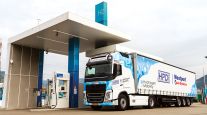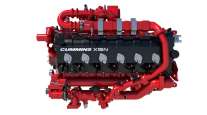Clean Energy Gets $150 Million Infusion to Build Natural Gas Fueling Network
This story appears in the July 18 print edition of Transport Topics. Click here to subscribe today.
Clean Energy Fuels Corp. received a $150 million cash infusion last week to help it build an extensive nationwide network of 150 natural-gas truck-fueling stations.
The investment comes from Chesapeake Energy Co., a major player in the natural gas industry, and will greatly expand the existing network of fueling stations.
The money will be used for liquefied natural gas fueling installations on interstate highways along truck routes at Pilot Flying J Travel Centers, Clean Energy’s Greg Roche, vice president of national accounts and infrastructure, told Transport Topics on July 13. Clean Energy intends to complete the project in two years, he said.
“The focus is on a national corridor network to serve the truckers,” said Roche, calling the company’s move the “natural gas highway.”
He said the plan is to appeal to fleets with a “last-mile network” aimed at local and shorter-haul services and to over-the-road operations.
Natural-gas provider Chesapeake announced on July 11 a $1 billion venture capital fund to invest in domestic fuels, including the $150 million for Clean Energy.
More than 100 public natural gas fueling locations are in California, mostly operated by Clean Energy, which also has more than 25 locations in the Northeast.
However, Department of Energy data show almost no truck-oriented natural gas fueling stations outside those regions: none along interstates in major trucking states such as Tennessee and Arkansas and just one in Georgia — at the Atlanta airport — and one in Ohio, at Newark, seven miles off Interstate 70. There are no stations in Iowa, Kentucky or West Virginia.
Clean Energy is building facilities at Pilot Flying J travel centers near the Texas cities of Dallas, Houston and San Antonio, as well as at Seville, Ohio, on Interstate 71 south of Cleveland, Roche said. Another natural-gas fueling station is to open in August at Baytown, Texas.
“The current lack of viable fueling stations is the major limiting factor right now to adding more LNG trucks to our fleet,” said Kirk Freimuth, vice president-dedicated at C.R. England Trucking, Salt Lake City, which is leasing five Kenworth LNG tractors. “Expanding the fueling network is key to our sustainability plans and our LNG truck purchases will expand with that network,” he said.
“We are supportive of anything that helps further develop the infrastructure to support natural gas as a fuel source,” said Scott Perry, group director of vehicle supply management at Ryder System Inc., Miami.
He added that Ryder already is using a network of company and public natural-gas fueling facilities in Southern California. As networks expand, he said, it will be important to have complementary public and company locations.
UPS Inc. and FedEx Corp. have extensive natural-gas fuel programs.
“We wanted to team up with Clean Energy because this is their area of expertise,” Mark Hazelwood, executive vice president of Pilot Flying J, Knoxville, Tenn., told TT on July 13. “This can have an immediate application.”
Natural-gas facilities under the companies’ exclusive arrangement will be located on interstates near cities, Hazelwood said, targeting regional truckload or less-than-truckload fleets.
“Whatever you can do with a diesel truck can be done with a natural-gas truck,” Roche said. “The story is getting better all the time as more OEMs develop more models.”
“America’s natural-gas producers have recognized that the lack of a robust fuel infrastructure has been a significant hurdle to the trucking industry’s use of natural gas as an alternate fuel [to diesel],” said Richard Moskowitz, American Trucking Associations’ vice president and regulatory affairs counsel.
Trucks burn more than 39 billion gallons of diesel fuel annually, according to ATA, which equals $152 billion annually at the average price on July 11 of $3.899 gallon.
Both Roche and Moskowitz estimated that natural gas is as much as $1.50 per gallon cheaper than diesel, or nearly 40% less, at current prices.
Over-the-road business will take longer to develop, Hazelwood said, because the range between refueling natural-gas tractors is shorter — about 600 miles — than diesel. A 150-gallon tank of diesel can carry tractors 1,000 miles or more.
Weight also can be an issue, because natural-gas tanks weigh about 1,000 pounds more than diesel versions, reducing maximum freight capacity, Moskowitz said.
Clean Energy’s expansion plans on the West Coast include a network to serve truckers on the Interstate 5 corridor between the Mexican border and the Canadian border, as well as along locations on Interstates 10 and 15 to the east, Roche said.
“We have analyzed the U.S. transportation sector during the past four years,” said Chesapeake CEO Aubrey McClendon, to find the best ways to reduce the outflow of $400 billion in fuel spending sent overseas annually.
Chesapeake also plans to spend $155 million for a 50% stake in privately held Sundrop Fuels, which is building a plant to make gasoline from natural gas and waste cellulose.




